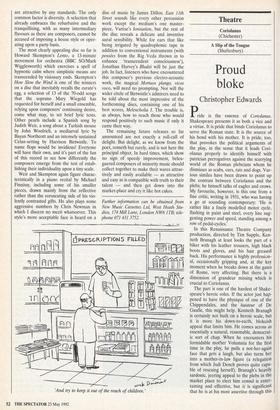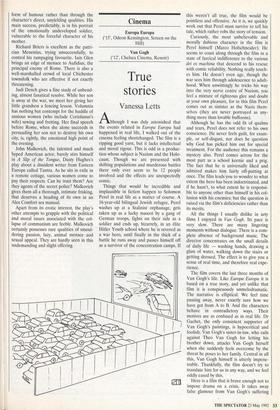Theatre
Coriolanus (Chichester) A Slip of the Tongue (Shaftesbury)
Proud bloke
Christopher Edwards
Pride is the essence of Coriolanus. Shakespeare presents it as both a vice and a virtue. It is pride that binds Coriolanus to serve the Roman state. It is the source of his bond with his mother. It is pride, too, that provokes the political arguments of the play, in the sense that it leads Cori- olanus properly to identify himself with patrician prerogatives against the scurrying world of the Roman plebeians whom he dismisses as scabs, curs, rats and dogs. Var- ious similes have been drawn to point up the contrast between Coriolanus and the plebs; he himself talks of eagles and crows. My favourite, however, is this one from a fine critic, writing in 1931, who was having a go at sounding contemporary: 'He is rather like a finely modelled motor cycle, flashing in paint and steel, every line sug- gesting power and speed, standing among a row of pedal-cycles.'
In this Renaissance Theatre Company production, directed by Tim Supple, Ken- neth Branagh at least looks the part of a biker with his leather trousers, high black boots and gloves, and his hair greased back. His performance is highly profession- al, occasionally gripping and, at the key moment when he breaks down at the gates of Rome, very affecting. But there is a dimension of grandeur missing which is crucial to Coriolanus.
The part is one of the hardest of Shake- speare's heroic roles. If the actor just hap- pened to have the physique of one of the Chippendales, and the hauteur of De Gaulle, this might help. Kenneth Branagh is certainly not built on a heroic scale, but it is more his down-to-earth, blokeish appeal that limits him. He comes across as essentially a natural, reasonable, democrat- ic sort of chap. When he encounters his formidable mother Volumnia for the first time in the play, he pulls a not-her-again face that gets a laugh, but also turns her into a mother-in-law figure (a relegation from which Judi Dench proves quite capa- ble of rescuing herself). Branagh's heavily sardonic, jeering appeal to the plebs in the market place to elect him consul is enter- taining and effective, but it is significant that he is at his most assertive through this
form of humour rather than through the character's direct, unyielding qualities. His main success, predictably, is in his portrait of the emotionally undeveloped soldier, vulnerable to the forceful character of his mother.
Richard Briers is excellent as the patri- cian Menenius, trying unsuccessfully, to control his rampaging favourite. lain Glen brings an edge of menace to Aufidius, the principal enemy of Rome. There is also a well-marshalled crowd of local Chichester townsfolk who are effective if not exactly threatening.
Judi Dench gives a fine study of unbend- ing, almost fanatical resolve. While her son is away at the war, we meet her giving her little grandson a fencing lesson. Volumnia has nothing but contempt for the huddle of anxious women (who include Coriolanus's wife) sewing and fretting. Her final speech before Rome, when she alone succeeds in persuading her son not to destroy his own city, is, rightly, the emotional high point of the evening.
John Malkovich, the talented and much hyped American actor, barely stirs himself in A Slip of the Tongue, Dusty Hughes's play about a dissident writer from Eastern Europe called Tantra. As he sits in exile in a remote cottage, various women come to pay their respects. Can he trust them? Are they agents of the secret police? Malkovich gives them all a thorough, intimate frisking, that deserves a heading of its own in an Alex Comfort sex manual.
Apart from its erotic interest, the play's other attempts to grapple with the political and moral issues associated with the col- lapse of communism are feeble. Malkovich certainly possesses rare qualities of smoul- dering passion, lazy, animal menace and sexual appeal. They are hardly seen in this undemanding and slight offering.



































































 Previous page
Previous page